
1870-1872 Dokkum (Fr): church St. Martinus en Bonifatius
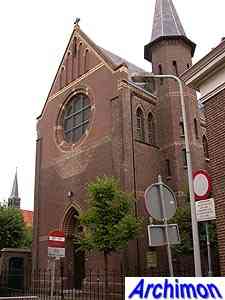
Three-aisled cruciform basilican church. Square tower at the south-side of the choir, polygonal stair-tower next to the front, non-extending transept.
1870 Wijtgaard (Fr): church O.L.V. Ten Hemelopneming
One-aisled cruciform church with tower. The design was inspired by the Romano-Gothic churches of the province of Groningen. Demolished in 1966.
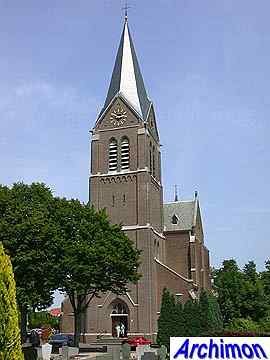
Neo-Gothic
basilica-shaped
church. Largely destroyed in 1944 and rebuilt with new tower and
transept after the war.
1870 Brussel, Belgium: completion church St. Jozef
Completion of the Carmelite church, in neo-Romanesque style.
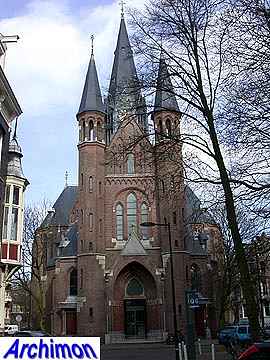
Cuypers' own favourite church. Combination of an octagonal centralized structure with a longitudinal axis, with in each corner two diagonally positioned two-sided chapels. Possible influences of southern German Baroque. The church is built on a relatively small oval 'island' in the middle of a street, many of the houses in which were also designed by Cuypers. Large tower on the crossing (destroyed by fire in 1904 and replaced by a new one designed by Cuypers' son Jos.) and smaller towers on both sides of both the front and the apse.
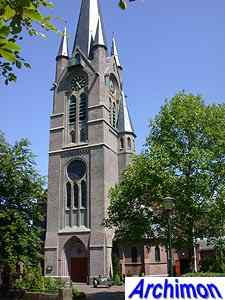
One-aisled
cruciform church
with a choir narrower than the nave. Cuypers made a first design for
this church in 1863. Nave enlarged by C. Hardeman in 1937, leaving only
the tower, transept and choir.
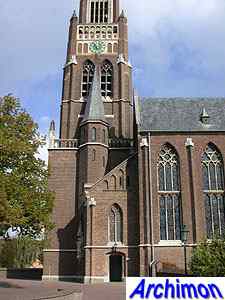
This Gothic church is enlarged in western direction. Cuypers destroyed the Romanesque tower, which was rebuilt in 1703, and added a neo-Gothic one. This tower was damaged in WWII after which its upper parts were rebuilt in a different style.
1871-1873, 1897-1899 Amsterdam (NH): church St. Willibrordus buiten de veste
Big three-aisled cruciform basilican church, inspired by 13th-century Gothicism of Ilde-de-France and Normandy. First designs 1864-1866. Construction of choir 1871-1873, transept and nave 1897-1899. Originally designed with 7 towers only one of which, designed by Jos Cuypers and his son Pierre jr., was added as late as 1924. Of the other towers only the lower segments were built. Demolished 1970-1971.
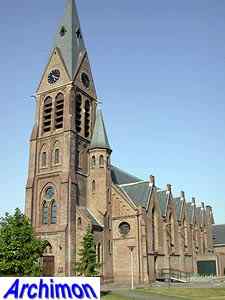
From 1866 on, Cuypers made three completely different designs for this church. The third was accepted, while elements of the first design were used for the St. Vituskerk in Blauwhuis (Fr) in 1869. The St. Willibrordus is a hall-church with a square-based tower, a variant of the one in Kloosterburen, with triangular gables at all four sides at the top. At the side-aisles all traves have separate gables with saddle roofs; while Cuypers until then was influenced by French and German Gothic, this is a first reference to indigenous Gothic styles in his work.
1872-1877 Mainz, Germany: restoration cathedral St. Martinus
Strengthening of the eastern part, construction of a crypt, reparation of the apse, side- and middle towers, all in neo-Romanesque style and using red sandstone. Cuypers replaces the middle tower, which was covered by an iron dome, by a polygonal tower with a spire.
1872 Delft (ZH): restoration tower New Church
Includes replacement of the spire. In conjunction with E.H. Gugel.
1873-1874 Tegelen (L): restoration and enlargement church
No further details.
1873-1874 Breda-Princenhage (NB): restoration church St. Martinus
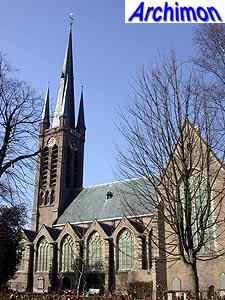
Restoration of a Gothic church, in cooperation with J.J. van Langelaar. Tower renewed in neo-Gothic style, new traceries and windows, new wooden barrel-vaults in the nave.
1874 Frederikshald, Norway: church St. Peter
Small one-aisled church in neo-Gothic style.
1874 Mons, Belgium: restoration and decoration Sacramentchapel
No further details.
1874-1876 Netterden (G): enlargement church St. Walburgis
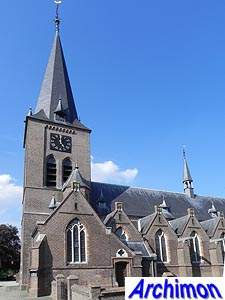
Transformation of a two-aisled late-Gothic church into a three-aisled neo-Gothic pseudo-basilica. Side-aisles with gables. Old tower heightened and altered in shape.
1875 Haarlem (NH): episcopal archive building
No further details.
1875-1878 Den Haag (ZH): church H. Jacobus de Meerdere
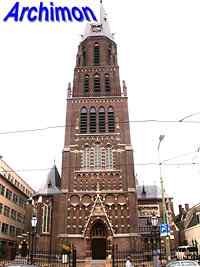
Three-aisled cruciform church. To make optimal use of the available space, the butresses are constructed as much as possible in the interior of the church, and the transept-arms do not extend the width of the nave. The apse of the choir has an ambulatory. The upper segment of the tower is of the type Cuypers added to the tower of the St. Petrus in Sittard some 15 years earlier.
1875-1877 Druten (G): church De Heilige Ewalden
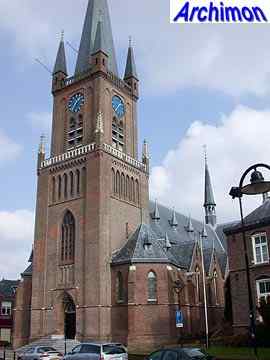
Three-aisled neo-Gothic cruciform basilican church, with a small tower on the crossing. Next to the main tower, which is in a rather decorative neo-Gothic style, is a polygonal baptistry. The traves of the side-aisles have gables. The centre between these marks the position of the windows in the clerestory.
1876-1889 Amsterdam (NH): Centraal Station

Big railway station in neo-Renaissance style. Several designs before work starts in 1881. Designed in cooperation with A.L. van Gendt, whose exact role is unknown but who was probably responsible for the physical construction of the building.
1876-1889 Amsterdam (NH): Rijksmuseum

Museum complex consisting of a big main building plus several additional buildings. Main building built in a mixture of Gothic and Renaissance styles. The result was much criticized by fanatical protestants, including King Willem III who refused to 'set foot in that monastery'.
1876 Heeg (Fr): church St. Jozef
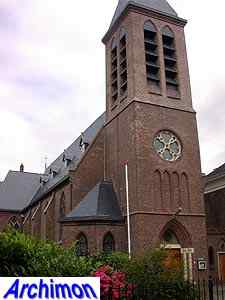
Cuypers found himself in a competition with architect A. Tepe for the assignment for this church, and was ordered to incorporate some of the elements of his rival's design into his own.
1876-1877 Chevremont, Belgium: church and monastery
The church is a three-aisled cruciform basilica in neo-Gothic style. Tower standing next to the choir is not much taller than the church. Use of brick and natural stone. The monastery is a square complex of four wings arranged around a square.
1876-1896 Utrecht (U): restoration cloisters and chapter house
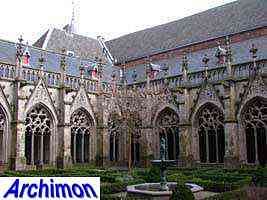
Restoration of parts of the former cathedral complex. Removal of later additions, reparation of walls, vaults, roofs and restoration and reconstruction of the Gothic ornamentation. In 1935 much of Cuypers' work was made undone during another restoration.
1876-1877 Lutjebroek (NH): church St. Nicolaas

Three-aisled neo-Gothic pseudo-basilican church with octagonal crossing. First a centralized church was built, which was later expanded with a longer nave and a tower. Later in each of the corners two rectangular chapels were added. A further enlargement followed in 1925 and was executed by J.Th.J. Cuypers and P. Cuypers jr..
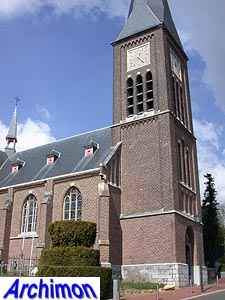
Cuypers originally designed a three-aisled church in 1870, but the design was simplified in 1876. Church consisting of only one aisle with pseudo-transepts.
Hexagonal chapel in neo-Gothic style. Demolished after 1950.
1877-1878 Hulst (Z): crossing-tower church St. Willibrordus
New crossing-tower for medieval church. Destroyed 1944.

The design of this church is influenced by the traditional building styles of the island of Ameland. Low walls and a tall roof. The church partly is made up of wooden structures which were made at the Cuypers' works in Amsterdam and then shipped to the island.
(Picture courtesy of Anton Lukassen)
1878-1881 Venlo (L): restoration church St. Martinus
New neo-Gothic upper segment and buttresses added to medieval tower and restoration of the walls. Portal added to the tower in 1881-1882, as well as restoration of the west-facade.
1879 Leeuwarden (Fr): old people's home
No further details.
1879 Sambeek (L): restoration church
Plan of 1879 executed from 1882 until 1889 under supervision by C. Franssen.
1879 Groningen (Gr): cemetary chapel
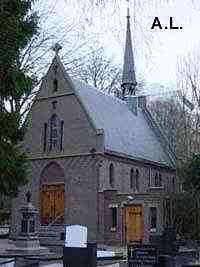
Chapel in neo-Gothic style.
(Picture courtesy of Anton Lukassen)

Three-aisled cruciform church in neo-Gothic style.
1880-1883 Sint-Odilienberg (L): restoration church St. Wiro
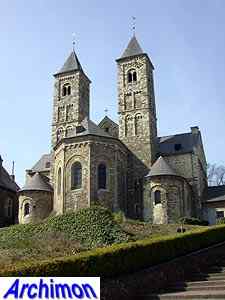
The original look of this old church, much of which had already been lost, is drastically altered, as a result of which the building loses much of its historical value. One of the old eastern towers had survived, Cuypers copied it to rebuild the other one.
1880-1882 Oosterhout (NB): restoration church St. Jan
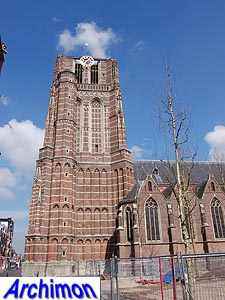
Restoration of a large Gothic church, executed by J.J. van Langelaar. New side-aisles are added, as is a stair-turret next to the southern transept-arm and a chapel next to the tower. Several chapels and a portal added during this restoration were removed in the 1970's.
1880-1882 Nijmegen (G): restoration town hall
Restoration included several drastic changes to the Gothic facade.
1880 Echt (L): chapel Carmelite convent
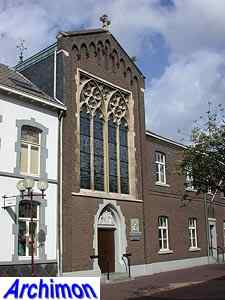
Chapel in neo-Gothic style.
1882-1884 Leeuwarden (Fr): church St. Bonifatius
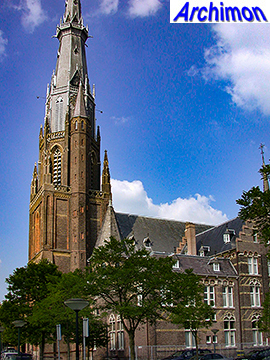
Big cruciform
basilica in neo-Gothic style. The wooden spire on the tower wsas
influenced by that of the St. Pancras in Enkhuizen and the New Tower in
Leeuwarden itself (demolished 1886). The tower itself owes much to the
tower of the New Church in Delft. The apse is remarkably lower than the
nave, and has a narrow ambulatory. This choir is probably influenced by
that of the cathedral of Trondheim, Norway, which in this period was
being completed.
1883-1884 Bussum (NH): church St. Vitus
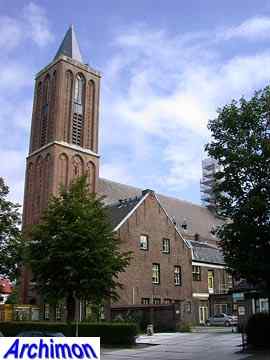
Neo-Gothic basilican church with single-aisled choir. Design based on the medieval Broederenkerk in Zutphen, on request of the commissioner. Tower designed by J.Th.j. Cuypers added in 1896. This tower was based on the example of the 16th-century tower of Eemnes-Buiten, but an earlier design by P.J.H. Cuypers shows a tower with an octagonal upper part. Closed in 1982, interior damaged by fire 1988. Rebuilt into apartments in 2000-2002.
1887-1917 Maastricht (L): restoration church O.L. Vrouwekerk
In conjunction with Jos. Cuypers. Apparently no structural changes to the church.
1883-1885 Amsterdam (NH): church St. Nicolaas en Barbara ('De Liefde')
Neo-Gothic three-aisled church with three-sided front and apse. Front is flanked by two round stair-turrets. Choir is lower than the nave. Closed and demolished in 1990.
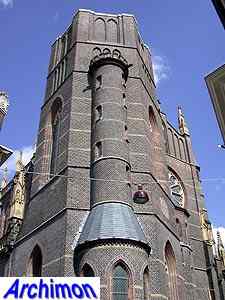
Built on a small piece of land that was filled as effectively as possible; the front is diagonally positioned, the nave is wide, the transepts do not extend, the choir is rectangular and partly built inside the presbytery. Wooden ceiling. Iron, covered with wood, is used for supportive parts. Tower is unfinished because a permit for its construction was never given. Design was inspired by Italian Gothicism, notably the San Croce in Florence.
1884-1886 Delft (ZH): church St. Hippolytus
Three-aisled neo-Gothic basilican church with two transepts. One-aisled choir is lower than the nave and has an ambulatory. Gables on top of each trave of the central aisle. Tower never completed. Closed 1971, demolished 1974.
1884-1886 Nijmegen (G): church St. Augustinus
Cruciform church with tall crossing-tower. Heavily damaged by the allied bombings of this city, and demolished shortly after WW2 .
1885-1886 Amersfoort (U): restoration Koppelpoort
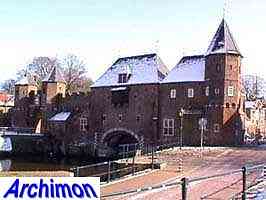
Restoration of a medieval gate, which consists of a land-gate and a water-gate. Cuypers' changes have more to do with taste than with historical accuracy. For instance he removes a storey between the two gates and replaces it with battlements.
1885 Achel, Belgium: Church Trappist abbey
Church in neo-Gothic style.
1885-1890 Susteren (L): restoration Stiftskerk
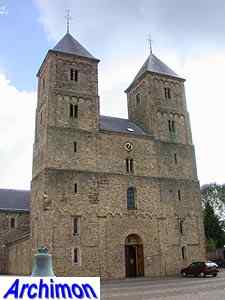
Restoration of an old Romanesque church. Cuypers completely changes the westwork of the church, following French examples. While the church originally had a single octagonal tower, now two square ones are added.
1886-1887 Groningen (Gr): church St. Jozef
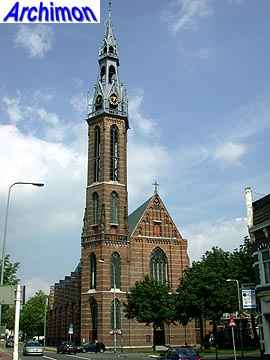
Neo-Gothic
basilican church,
designed in cooperation with Joseph Cuypers. The design is based on
that of the Broederenkerk in Zutphen, except for the hexagonal tower
next to the front facade. Previously the Broederenkerk had formed the
inspiration for the St. Vitus in Bussum.
This church is the cathedral of the bishop of Groningen since 1980.
1887 Roermond (L): Episcopal tomb and chapel
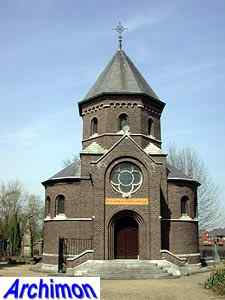
Cloverleaf-shaped building in neo-Romanesque style. Higher central space with dome.
1887-1888 Amstelveen-Bovenkerk (NH): church St. Urbanus
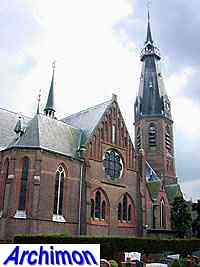
Three-aisled hall-church with transept. All aisles under one roof, with gables and saddle-roofs on every trave of the side-aisles. As the choir points to the east, Cuypers adds a hexagonal tower, inspired by that of the Grote Kerk in Den Haag, in order to have the main entrance parallel with the road.
1888-1891 Zutphen (G): restoration Drogenapstoren

Restoration of a medieval tower. Reconstruction of the turrets at the corners, as well as the battlements and spire.
1888 Zutphen (G): restoration Berkelpoort

Restoration of a medieval watergate. Cuypers respects the ruined state of the building and preserves it by adding a layer of cement on top of the walls. In 1951-1952 a new, more reconstructing restoration follows, which largely destroys Cuypers' work.
1888 Davos, Switzerland: design for a church.
Executed several years later. No further details.
1889-1891 Amsterdam (NH): church Maria Magdalena
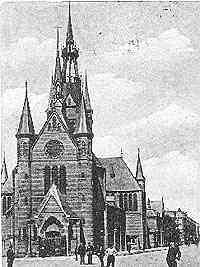
Probably the strangest ground-plan of all of Cuypers' churches. Three-aisled cruciform basilican church, built on a triangular piece of land. The front of the church is very narrow. The nave widens towards the back, to a rectangular central space with three-sided transept-arms. Behind that is an even wider part with the choir and two diagonally postioned chapels in each corner between choir and transept-arms. Square crossing-tower. Demolished in 1968.
1890 Veghel (NB): Congregatiekapel

Chapel in neo-Gothic style, behind Cuypers' church from 1858-1862. Now a mosque.
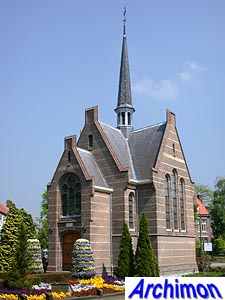
Small centralising church in neo-Gothic style.
1891-1902 Rolduc (L): restoration abbey-church
Work among others includes the replacement of a Gothic choir by a reconstruction of a clover-shaped one. In conjunction with Jos. Cuypers.
1891-1892 Hilversum (NH): church St. Vitus
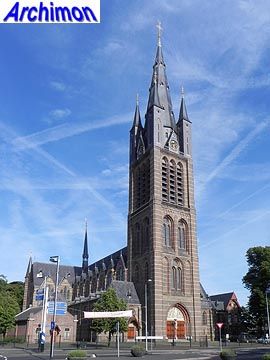
Mostly five-aisled cruciform basilican church with a transept that far extends the width of the nave and a tall western tower with a spire and turrets at the corners. Wooden vaults over the nave. English influences are the triplet-windows of the higher, central aisle and the 'climbing' series of five lancet-windows in the facades of the transept. The apse is in early French Gothic style. Design with contributions by Jos. Cuypers.
1892-1912 Haarzuilens (U): reconstruction castle
A virtually new castle was built on the ruins of the original castle. Cuypers chose not to reconstruct the original state of the castle but rebuilt it in neo-Gothic style instead with the use of modern materials. The use of big steel ornaments has caused some sagging. Where the village of Haarzuilens was a park was made. A new village was built at a bigger distance from the castle. Cuypers and his son Jos. designed several buildings for the new village which was given a medieval appearance.
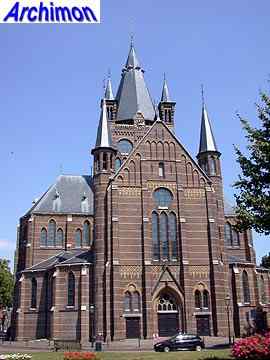
Neo-Gothic cruciform church with centralizing elements based on the floorplan of the Liebfraukirche in Trier, Germany's oldest Gothic church. In each corner where nave, transept and choir meet two diagonal chapels have been built, while the square tower is build at the crossing. Choir and transept have polygonal apses. Cuypers' son Jos. Cuypers is co-responsible for the design. P.J.H. Cuypers also designed part of the inventory and the stained-glass windows.
1894 Oud-Valkenburg (L): restoration Castle Schaloen
Restoration in neo-Gothic style of a castle built in the 17th century.
1895 Nijswiller (L): restoration and extension church St. Dionysius
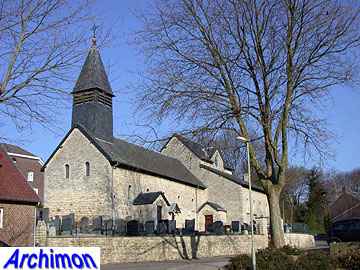
Restoration of a 12th-century Romanesque church. Includes the addition of a three-aisled extention on the east side and a rectangular choir with round apse. Use of natural stone. In conjunction with Jos. Cuypers. A first design was made in 1890, which was executed after several changes.
1895 Groningen (Gr): church St. Martinus
Neo-Gothic cruciform basilican church. Despite a design that was as economical as possible, this became the most expensive catholic church in the province of Groningen. Instead of a tower it had a tall wooden spire on the crossing. Became the first cathedral of the bishop of Groningen in the 1950's, and was demolished in 1982 after plans to turn it into the university library had been abandoned.
1897 Helmond (NB): church Heilig Hartkerk
Further details unknown. Demolished in 1956.
1897-1898 Tilburg (NB): church Heilig Hartkerk ('Noordhoek kerk')
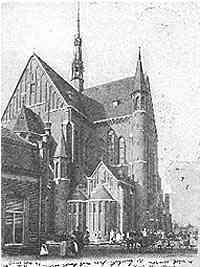
Big church with a very wide central aisle. Original design included a tower which was never built. Porch added later. Demolished in 1975.
1903-1907 Hoeven (NB): Major seminary Bovendonk

Large complex in Neo-Gothic style, around a rectangular court yard. The chapel was replaced in 1922-1923 by a larger one, designed by J.Th.J. Cuypers.
1904 Valkenburg (L): restoration and enlargement church H.H. Nicolaas en Barbara
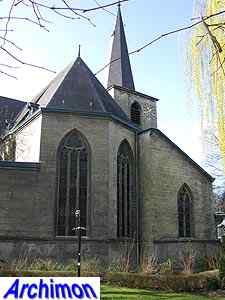
Restoration and enlargement of an originally medieval church. Chapels added to the transept as well as the addition of a three-aisled trave and a choir of two traves. The side-aisles were extended along the sides of the tower. A porch with lateral chapels was added to the front of the tower. All extensions were built using marl.
1904-1912 Klimmen (L): restoration church St. Remigius

Reconstruction of the Romanesque state of a much altered church. New transept and choir in Romanesque style. Tower heightened with one segment. In cooperation with Jos. Cuypers.
1905 Vlissingen (Z): English church
Octagonal building in Gothic style. Cuypers' only true centralizing church and probably his only design for a protestant denomination as well. Demolished c. 1960.
1905 Utrecht (U): restoration Huis Zoudenbalch

Restoration of the facade of a medieval house, destroyed by fire in 1903. Reconstruction of the windows and the battlements.
1906-1909 Roermond (L): restoration protestant church, former Minderbroederskerk
Among others reconstruction of some vaults.
1907-1908 Oosterhout (NB): church St. Antonius
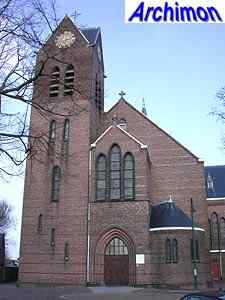
Designed in cooperation with J. Oomen, whose exact role is unclear. Probably Cuypers designed the church, with Oomen further executing it. Three-aisled cruciform pseudo-basilican church in late neo-Gothic style. On the crossing a square pointed dome. Front tower not finished according to the original design. Only in 1959 was the upper segment added.
1913 Venlo (L): church O.L. Vrouw Onbevlekt Ontvangen
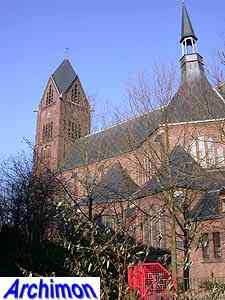
Three-aisled neo-Gothic cruciform basilican church with hexagonal crossing with a dome which is very similar to the one in Oosterhout. This was Cuypers' last church design. Badly damaged during WWII and restored afterwards by architect Stoks, who replaced the spire.
1914 Hamont, Belgium: chapel Ursuline convent
Chapel in neo-Gothic style.
1915-1916 Valkenburg (L): open-air theatre
No further details.
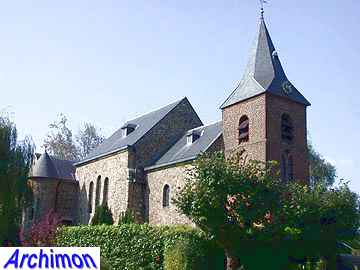
Restoration and enlargement of church from the 11th century. A new choir in Romanesque style is added, built with stones from the river.
1916 Venlo-Genooi (L): Enlargement pilgrimage chapel O.L. Vrouw
Extension of the choir of a chapel with an ambulatory in the shape of a cloverleaf.